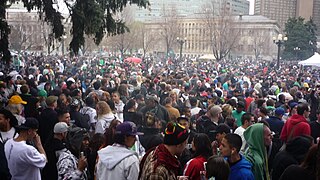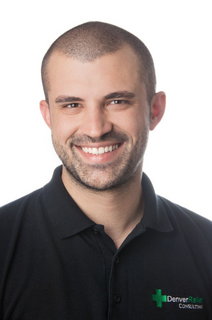Related Research Articles

The Oregon Liquor and Cannabis Commission (OLCC), formerly known as Oregon Liquor Control Commission is a government agency of the U.S. state of Oregon. The OLCC was created by an act of the Oregon Legislative Assembly in 1933, days after the repeal of prohibition, as a means of providing control over the distribution, sales and consumption of alcoholic beverages. To this end, the agency was given the authority to regulate and license those who manufacture, sell or serve alcohol. Oregon is one of 18 alcoholic beverage control states that directly control the sales of alcoholic beverages in the United States. In 2014, the passage of Oregon Ballot Measure 91 (2014) legalized the recreational use of marijuana in Oregon and gave regulatory authority to the OLCC.
The Washington State Liquor and Cannabis Board, formerly the Washington State Liquor Control Board, is an administrative agency of the State of Washington. The Liquor and Cannabis Board is part of the executive branch and reports to the Governor. The board's primary function is the licensing of on and off premises establishments which sell any type of alcohol, and the enforcement and education of the state's alcohol, tobacco, and cannabis laws.
Safer Alternative For Enjoyable Recreation (SAFER) is a non-profit organization based in Denver, Colorado. The SAFER campaign was initially launched in Colorado on the campuses of the University of Colorado at Boulder (CU) and Colorado State University (CSU) in response to the alcohol overdose deaths of CSU sophomore Samantha Spady, 19, and 18-year-old CU freshman Lynn "Gordie" Bailey. SAFER, led by Mason Tvert, argued that students should not be punished more severely for using marijuana – which is incapable of causing death by overdose—than for using the potentially fatal drug alcohol.

A Cannabis Social Club (CSC), sometimes called Cannabis Club, Cannabis Association, or Teapad, is an industry model for regulated cannabis organised as non-profit cooperatives in which cannabis is cultivated, shared, and enjoyed collectively, usually for the purpose of relaxing or for social communion.

Cannabis in Oregon is legal for both medical and recreational use. In recent decades, the U.S. state of Oregon has had a number of legislative, legal, and cultural events surrounding use of cannabis. Oregon was the first state to decriminalize the possession of small amounts of cannabis, and among the first to authorize its use for medical purposes. An attempt to recriminalize possession of small amounts of cannabis was turned down by Oregon voters in 1997.

Cannabis in California has been legal for medical use since 1996, and for recreational use since late 2016. The state of California has been at the forefront of efforts to liberalize cannabis laws in the United States, beginning in 1972 with the nation's first ballot initiative attempting to legalize cannabis. Although it was unsuccessful, California would later become the first state to legalize medical cannabis with the passage of the Compassionate Use Act of 1996. In November 2016, California voters approved the Adult Use of Marijuana Act to legalize the recreational use of cannabis.

Cannabis in Colorado has been legal for medical use since 2000 and for recreational use since late 2012. On November 7, 2000, 54% of Colorado voters approved Amendment 20, which amended the State Constitution to allow the use of marijuana in the state for approved patients with written medical consent. Under this law, patients may possess up to 2 ounces (57 g) of medical marijuana and may cultivate no more than six marijuana plants. Patients who were caught with more than this in their possession could argue "affirmative defense of medical necessity" but were not protected under state law with the rights of those who stayed within the guidelines set forth by the state. The Colorado Amendment 64, which was passed by voters on November 6, 2012, led to recreational legalization in December 2012 and state-licensed retail sales in January 2014. The policy has led to cannabis tourism. There are two sets of policies in Colorado relating to cannabis use: those for medicinal cannabis and for recreational drug use along with a third set of rules governing hemp.

Oregon Ballot Measure 80, also known as the Oregon Cannabis Tax Act, OCTA and Initiative-9, was an initiated state statute ballot measure on the November 6, 2012 general election ballot in Oregon. It would have allowed personal marijuana and hemp cultivation or use without a license and created a commission to regulate the sale of commercial marijuana. The act would also have set aside two percent of profits from cannabis sales to promote industrial hemp, biodiesel, fiber, protein, and oil.

Colorado Amendment 64 was a successful popular initiative ballot measure to amend the Constitution of the State of Colorado, outlining a statewide drug policy for cannabis. The measure passed on November 6, 2012, and along with a similar measure in Washington state, marked "an electoral first not only for America but for the world."

The legal history of cannabis in the United States began with state-level prohibition in the early 20th century, with the first major federal limitations occurring in 1937. Starting with Oregon in 1973, individual states began to liberalize cannabis laws through decriminalization. In 1996, California became the first state to legalize medical cannabis, sparking a trend that spread to a majority of states by 2016. In 2012, Washington and Colorado became the first states to legalize cannabis for recreational use.

Cannabis in Massachusetts is legal for medical and recreational use. It also relates to the legal and cultural events surrounding the use of cannabis. A century after becoming the first U.S. state to criminalize recreational cannabis, Massachusetts voters elected to legalize it in 2016.

Kayvan Khalatbari is an Iranian-American entrepreneur; he was a mayoral candidate in Denver, Colorado, in 2019.

The Adult Use of Marijuana Act (AUMA) was a 2016 voter initiative to legalize cannabis in California. The full name is the Control, Regulate and Tax Adult Use of Marijuana Act. The initiative passed with 57% voter approval and became law on November 9, 2016, leading to recreational cannabis sales in California by January 2018.

Cannabis in Nevada became legal for recreational use on January 1, 2017, following the passage of Question 2 on the 2016 ballot. The first licensed sales of recreational cannabis began on July 1, 2017.

Cannabis in New Jersey is legal for both medical use and recreational use. An amendment to the state constitution legalizing cannabis became effective on January 1, 2021, and enabling legislation and related bills were signed into law by governor Phil Murphy on February 22, 2021.

Cannabis in Washington relates to a number of legislative, legal, and cultural events surrounding the use of cannabis. On December 6, 2012, Washington became the first U.S. state to legalize recreational use of marijuana and the first to allow recreational marijuana sales. The state had previously legalized medical marijuana in 1998. Under state law, cannabis is legal for medical purposes and for any purpose by adults over 21.

In Washington, D.C., cannabis is legal for both medical use and recreational use for possession, personal use, cultivation, transportation and gifting, and for retail sale once a regulatory system is implemented following an affirmative vote by the residents on a 2014 ballot initiative. The United States Congress exercises oversight over the government of the District of Columbia, preventing the local government from regulating cannabis sales like other jurisdictions with authority derived from a U.S. state.

Cannabis in Michigan is legal for recreational use. A 2018 initiative to legalize recreational use passed with 56% of the vote. State-licensed sales of recreational cannabis began in December 2019.
The Cannabis Regulation and Tax Act is an act legalizing and regulating the production, consumption, and sale of cannabis in Illinois. It was approved by both houses by May 31, 2019 and came into effect January 1, 2020.
References
- ↑ "Denver, Colorado, Public Marijuana Use in Designated Areas, Initiated Ordinance 300 (November 2016)". Ballotpedia. Retrieved 18 January 2017.
- ↑ Baca, Ricardo (8 November 2016). "Initiative 300: Everything you need to know about Denver's social cannabis use measure". The Denver Post.
- ↑ Murray, Jon (18 November 2016). "Bars can't seek new Denver social marijuana use permits allowed by Initiative 300, state says". The Denver Post.
- ↑ "Private Marijuana Clubs Open And Public Use". Colorado General Assembly. State of Colorado.
- ↑ "Denvers Neighborhood Supported Cannabis Consumption Pilot Program". Limited Social Use. 24 April 2017. Retrieved 24 April 2017.
- ↑ Murray, Jon (23 February 2017). "Denver social marijuana advisory group works through details — but disagrees about alcohol". The Denver Post. Retrieved 19 March 2017.
- ↑ "Denver, Colorado, Public Marijuana Use in Designated Areas, Initiated Ordinance 300 (November 2016) - Ballotpedia" . Retrieved 2017-04-26.
- ↑ "Social marijuana use committee includes supporters, opponents and neighborhood advocates – The Denver Post". 7 January 2017. Retrieved 2017-04-24.